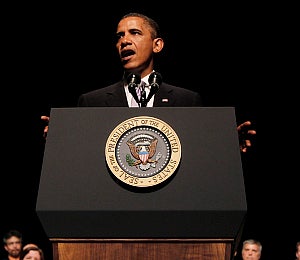







When President Obama announced the next phase of his fatherhood initiative this week,he spit out a rapid-fire set of statistics to underscore its importance. “We know that children who grow up without a father are more likely to live in poverty,” he said. “They’re more likely to drop out of school. They’re more likely to wind up in prison. They’re more likely to abuse drugs and alcohol.” To combat this issue, Obama has launched the President’s Fatherhood and Mentoring Initiative, which involves a proposed $500-million fund for local programs such as job training and parenting classes, as well as a jobs program for ex-offenders and low-income, non-custodial fathers. The man heading up the initiative is Joshua DuBois, 27, Executive Director of the White House Office of Faith-Based and Neighborhood Partnerships. ESSENCE.com talked with DuBois about a legal system that is often stacked against fathers, the role of marriage in the program — and the difference between lecturing absentee dads for not being involved and creating solutions to assist them. ESSENCE.com: In President Obama’s prior remarks on fatherhood, particularly concerning Black men, he mostly called on more men to take responsibility for their children — a message that garnered criticism for ignoring social factors that cause many fathers to be absent. In this next phase, your office is focusing on what the government and communities can do to help more men become involved fathers. What went into this evolution? JOSHUA DuBOIS: This initiative is rooted in the President’s belief that we need to listen first before we act. We all know that we have real challenges related to father absence in America. But it’s not enough to recognize that there’s a challenge. We have to understand the details: What are the obstacles that American families are facing, especially in these tough economic times? Why are dads not stepping up to the plate? What can we all do — individuals, community-based organizations, and the government — to address this? So we kicked off what the President calls a “national conversation on responsible fatherhood.” We went to communities across the country and had roundtables with everyday dads, moms, faith-based leaders, nonprofit heads and others, and really dug into this issue of fatherlessness. In terms of the evolution, it was really rooted in the national conversation from these roundtables, town halls and listening sessions, where we got to the root of the problem before proposing this new initiative. ESSENCE.com: There’s another shift at work here: the Bush administration emphasized traditional marriage, whereas your office is talking about fatherhood no matter where fathers may be. Is that a deliberate distinction you’re making? DuBOIS: The President has spoken to this issue of responsible fatherhood for many years now because it’s so deeply personal to him. He grew up without his father in the home, and he’s been in communities like Chicago where there’s a real crisis of fatherlessness, so for years, long before he became President, this issue of father absence has been important to him. At the same time, he definitely lifted up the importance of marriage today in his remarks. You’ll notice that the fund that we are proposing to support local efforts is the called the Fatherhood, Marriage and Families Innovation Fund. So, certainly marriage is a key part of our approach here. But this notion of fatherlessness is something that struck a chord with the President, just as it has with many in communities around the country. ESSENCE.com: Back when you and I first spoke about the overall fatherhood initiative last summer, you talked about looking to change policies that discourage fatherhood — welfare stipulations that penalize two-parent families, for example, and family courts that favor mothers to the exclusion of fathers’ rights. Has there been any progress on those issues? DuBOIS: We are doing what we can from the administration’s perspective to be sensitive to the challenges that some dads are facing today. One thing the President talked about is a new program the Department of Justice is setting up called Fathering Re-Entry Courts, where instead of just letting a guy hit the streets when he’s concluding incarceration, you equip that young man with job training — but also with relationship counseling and the tools he needs to reconnect to both his family and his community in a safe way that can be successful in the long run. That’s a new effort that the Department of Justice is investing in now. One of the other things the President mentioned was our work to support transitional jobs programs. The President has already funded this, and you’ll see some grant announcements in the coming weeks. These are jobs for non-custodial parents who have faced some real barriers to employment, either because they were formerly incarcerated or for other reasons. You help them find a job, you try to support them economically until they can get on their feet and transition into employment. So, ex-offender reentry and transitional jobs are two really critical areas that the President has stepped up to support. ESSENCE.com: What can people do to learn more about these programs and get involved? DuBOIS: Go to Fatherhood.gov, which will be continuously updated in the coming days and weeks to serve as a hub for our work on fatherhood. There you can sign up for the President’s fatherhood and mentoring initiative, and you’ll begin receiving updates — and not just from us. Most of this is not about the government communicating, but instead from key leaders in the fatherhood and family field.






